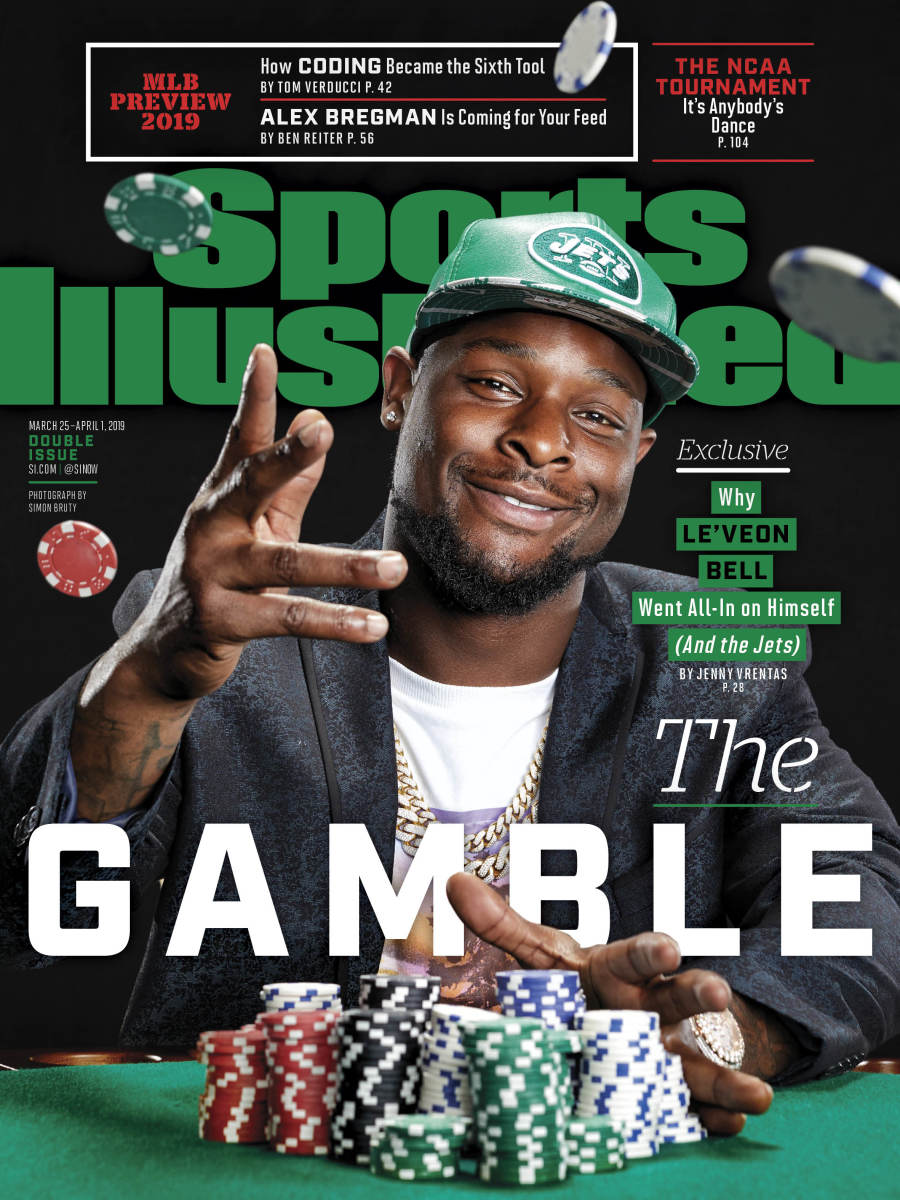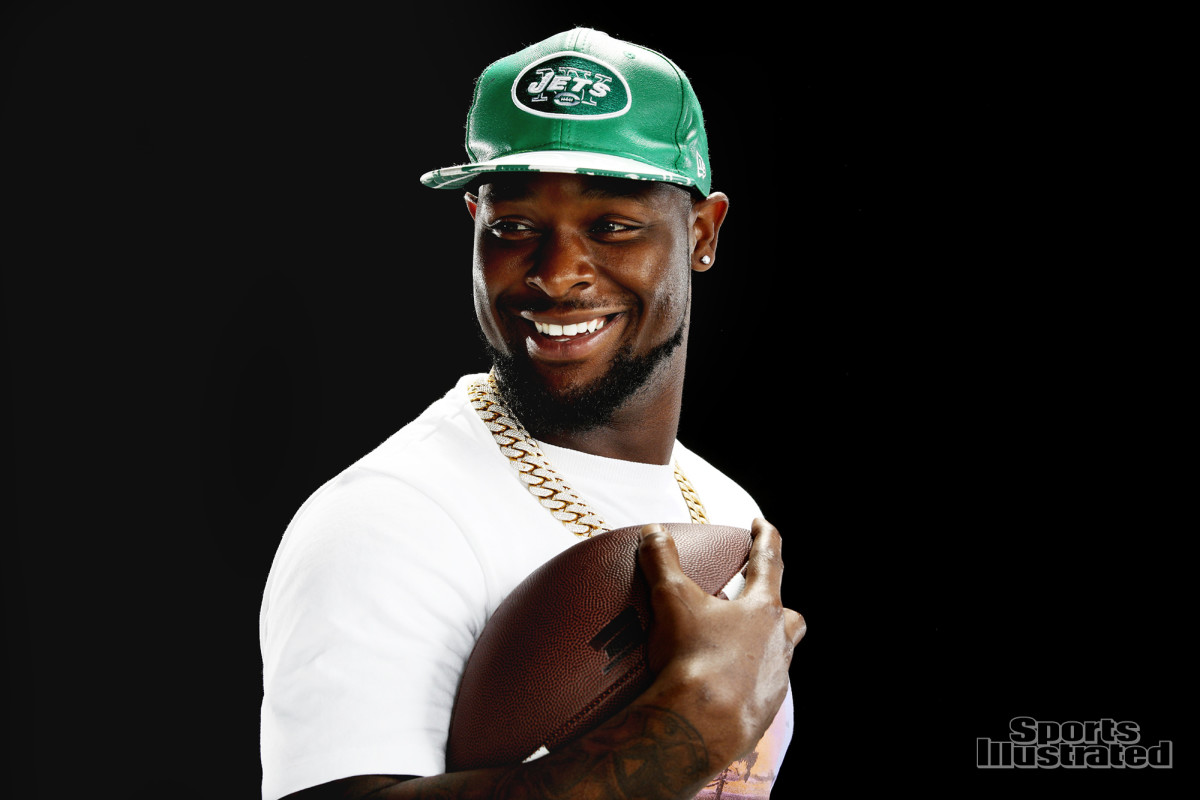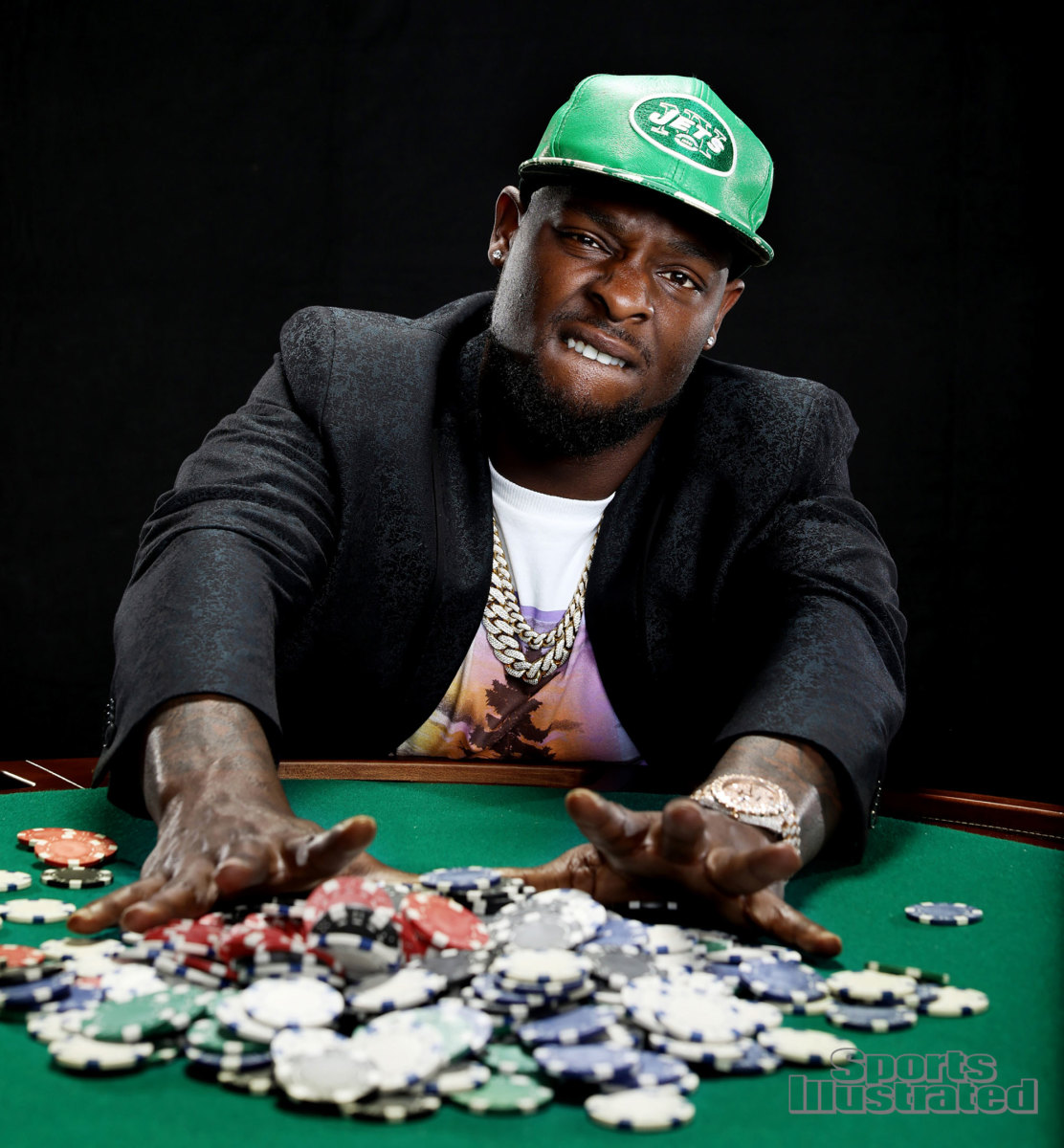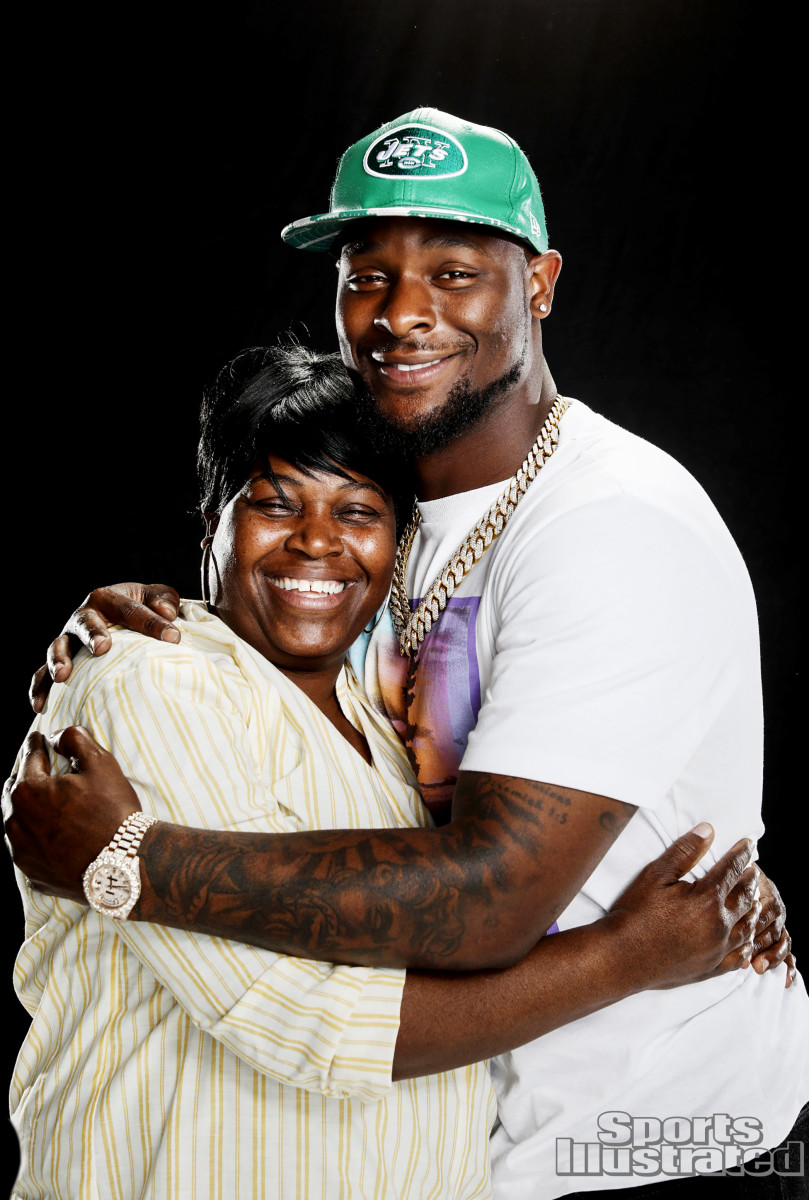Le’Veon Bell Is All-In on Himself (and the Jets)

For more episodes of The Big Interview on SI TV, including Baker Mayfield, Terrell Owens, the Eagles O-line, sign up for a free trial seven-day trial.
The clock has just passed 2 a.m., and suddenly Le’Veon Bell is standing atop a banquette at the front of the Rockwell, in South Beach. The 27-year-old running back’s arrival at the nightclub has triggered an announcement by the DJ, and soon a parade of cocktail waitresses is marching over to deliver bottles of premium liquor affixed with glimmering sparklers and a light-up sign bearing the logo of the football star’s new rap album, Life’s a Gamble.
The club—the type of place that doesn’t even open its doors until 11:30 on Saturday nights—has billed this evening as a) an exclusive album-release party for Bell and b) a birthday celebration for a bleached-hair, Viking-bearded millennial-influencer who goes by Mr. Miami. Any notions about this being an intimate event, though, are immediately betrayed by the hordes of spring breakers from Texas and Wisconsin looking to blow off steam.
It’s been a while since Bell has performed in front of a crowd, but finally, around 3 a.m.—wearing a white graphic T-shirt, double gold chains, mirrored aviators and a Louboutin backpack and shoes—he grabs a microphone and unleashes “Free at Last,” a track he wrote about his very public and protracted contract dispute with the Steelers, which had finally come to an end days earlier.
Money is making me rude
I see that I’m in the news
And they not signing me back, but
They got to pay for it too
Bell recorded this particular song at his home, just up A1A in Aventura, during the first football season he missed in 23 years. (Or the first entire season, at least; he was suspended two games in 2015, for a marijuana-related arrest, and then three games in ’16, for missing drug tests, both violations of the NFL’s substance abuse policy.) Over his first five years in the pros Bell distinguished himself as one of the best players at his position. In ’17 he touched the ball a whopping 406 times (including 85 catches) for 1,946 all-purpose yards. And then, last season, he didn’t play. At all. In July he turned down a long-term contract offer with Pittsburgh, and he ultimately decided not to take on the injury risk or added wear-and-tear of playing a second straight season on a one-year franchise tag.
Bell admits that when the Nov. 13 deadline to sign that $14.5 million franchise tender and report to Steelers headquarters came and went, he stopped working out for about a month. Instead he retreated to his home recording studio, fueling his music career with the fear/thrill/charge of the gamble he was taking on his football career. Finally, on March 14—some 420 days after he last pulled on his black and gold number 26—he re-emerged with a new rap album and a new four-year, $52.5 million contract with the Jets, including $25 million in fully guaranteed money, a record for the position.
There’s been plenty of second-guessing of Bell’s strategy, but as he pulls the microphone close to his mouth at Rockwell and spits out lyrics of self-defense—You want to do what I do/I don’t think you got a clue—what Bell can say for the first time in a long while is that he has no doubts about his next step.

Fourteen hours after his cameo at Rockwell, Bell is stuck in traffic on his way to a photo shoot in Miami’s Art District. His mother, Lisa, calls to check on his whereabouts, even if the past year has given her plenty of practice in waiting patiently. “I just want to see him play again,” she says. Last year Lisa bought front-row seats to each of the Steelers’ first three games, even though she knew her son wouldn’t be playing. She wore a camouflage team ball cap but realized she wasn’t quite as incognito as she’d believed when receiver Antonio Brown spotted her in the front row, Week 3 in Tampa Bay, and waved.
Bell has played football since he was four; by high school, Lisa’s most effective disciplinary maneuver for her son was threatening to not let him play in that week’s game. As Le’Veon sat out last season, he ribbed his mom about that old tactic, pointing out how much they both missed the game.
To scratch his football itch Bell played endless hours of Madden and called Lisa when the Steelers were on TV, analyzing Pittsburgh’s game plan and displaying Tony Romo–like predictive powers. He texted James Conner, his backfield replacement, congratulating him on big plays—but he also fixated on how much work Conner was receiving on the goal line, more than he’d gotten himself.
Back in the summer of 2017, the first time the Steelers offered Bell a long-term deal, reportedly five years at $12 million per, Lisa wanted her son to take it. So did Bell’s agent, Adisa Bakari. “Everyone thought I was tripping,” Bell says of his declining and choosing to play that season on the one-year, $12.1 million franchise tag.
From Bell’s perspective, though, he’d earned more than what was being offered. “They took every ounce from me until I couldn't go no more,” he says. “When it was time to get paid, it was like, Y’all knew what [I’d been through].” Meaning: He’d just gutted through the 2016 playoffs with a painful groin injury that at one point left him unable to sit up in bed. He’d played an entire divisional-round game against the Chiefs, despite telling teammates at halftime that he was unsure if he could finish, and then he received a Toradol injection before the AFC Championship Game against the Patriots. The first time he was tackled in that game at New England in January 2017 he felt like his left leg was about to rip off; when he went back in, he couldn’t hit a hole even if it opened up. His day, and eventually the team’s season, was over. “I feel like that was our Super Bowl year,” Bell says. “I just ended up getting hurt.”
At the same time, the market for running backs was sagging. Devonta Freeman’s extension with the Falcons, signed in August 2017, averaged just $8.25 million per year. As player salaries rose across the NFL, the franchise-tag number for backs—calculated as an average of the top five salaries at the position that year—actually dropped. Citing his value in the passing game (and the fact that he was Pittsburgh’s No. 2 receiver behind Brown), Bell tried to counter this trend, asking for $15 million per year from the Steelers.
Instead, he played the 2017 season on the one-year franchise tag. Then, he says, the day after a playoff loss to the Jaguars in January ’18, Steelers general manager Kevin Colbert and coach Mike Tomlin pulled him into an office alone. The team would tag him for a second consecutive season, this time at $14.5 million, but Bell says they told him that day they’d get a long-term deal done. When the Steelers eventually made an opening bid well below what Bell was looking for, he told Bakari to counter by asking for $17 million per season. In the end, Bell hoped, they’d end up at his $15 million benchmark.
Pittsburgh’s final offer, Bell says, fell short: five years, $70 million—$14 million per, with the only fully guaranteed money being a $10 million signing bonus. (The Steelers have a policy of not offering future guarantees in veteran deals.) But it was structured to pay out $33 million over the first two seasons, and Pittsburgh has never cut a player one year into a contract that lucrative.
“I was so close,” Bell admits now. “Like, I almost [signed] it.”
Many NFL pundits believe Bell should have taken that deal, as it offered more money through both two and three years than his new Jets contract does. But Bell, who watched teammate Ryan Shazier’s career potentially end on a single play, cared foremost about the guaranteed money. Plus, the decision, he says, wasn’t just about money.

Back in 2013, when Pittsburgh drafted Bell, he was ecstatic: His mom raised him outside Columbus, Ohio, but she’d come from a family of Steelers supporters, and she already had a team flag hanging by her front door. Flash forward five years, to when Bell turned down last summer’s extension offer, and he was starting to think: It’s time for a fresh start.
There have been inklings all offseason of other factors that played a part in Bell’s departure. After Brown forced a trade to the Raiders earlier this month, he expressed frustrations with Pittsburgh quarterback Ben Roethlisberger. Another former Steeler, running back Josh Harris, was more pointed, asserting that Roethlisberger once intentionally fumbled the ball to protest a play call. Bell says Roethlisberger wasn’t the only factor in his wanting to leave Pittsburgh—but “yes, it was a factor.”
Bell says he and Roethlisberger didn’t quite vibe; Bell wishes they’d shared a “more open, more genuine, more real” relationship. He says players didn’t feel like they were treated by the QB as being on the same level as him. “Quarterbacks are leaders; it is what it is,” Bell says. But “you’re still a teammate at the end of the day. You’re not Kevin Colbert. You’re not [team president Art] Rooney.” (On the subject of quarterbacks in general, Bell says that, given the chance to do everything over, “I’d be playing QB.” Or, he says, in the NBA, where contracts are fully guaranteed and players are compensated by production, not position.)
Despite his output in 2017, when he was named an All-Pro for the second time, Bell says he didn’t feel as if the Steelers’ game plans were designed to feature him or that he had a stake in what plays were being called. He acknowledges, “Ben is a great quarterback,” but says Roethlisberger’s personal preferences played a role in who was given the opportunity to make plays.
Says Bell, “The organization wants to win. Tomlin wants to win. Ben wants to win—but Ben wants to win his way, and that’s tough to play with. Ben won a Super Bowl, but he won when he was younger. Now he’s at this stage where he tries to control everything, and [the team] let him get there.
He adds: “So if I’m mad at a player and I’m not throwing him the ball—if I’m not throwing A.B. the ball and I’m giving JuJu [Smith-Schuster] all the shine or Jesse [James] or Vance [McDonald] or whoever it is, and you know consciously you’re making your other receiver mad but you don’t care—it’s hard to win that way.”
At times last season, Bell’s feelings about wanting out of Pittsburgh were mutual. When he didn’t report for Week 1 after missing camp, as he had the previous season, his linemen spoke out publicly. Center Maurkice Pouncey called Bell “a little selfish”; guard Ramon Foster said Bell “doesn’t give a damn.” Bell says he never told anyone he’d be there Week 1, though it’s clear his plan was fluid, influenced by the feelings hurt in negotiations and by his teammates’ public comments.
The missed opportunity, for a team with a now-37-year-old QB, isn’t lost on anyone, including Bell, who says, “If I’d played this year, we would have won the Super Bowl. Think about the weapons we had. I would have been unhappy as hell, but if I was sprinkled in. . . . When we were winning games, it wasn’t bothering me how much I was getting the ball. Last year was our year, that’s why I didn’t understand why they didn’t just get it done. They had the money. Get it done and go win a Super Bowl.”
Bell says he first planned to show up after Week 1, and then his target shifted to the Week 7 bye, but the Steelers wouldn’t assure his agent that they wouldn’t trade him (potentially compromising his value as an upcoming free agent by inserting him into a new offense midseason) or use its (limiting) transition tag on him for next season.
Later in the year, one week before the Nov. 13 deadline, Bell tweeted “farewell Miami” and flew from Miami to Pittsburgh. “I was gonna go back to play, forget everything that happened all year, bite the bullet and hope they respect me,” he says. “Because I just wanted to play football.” (He also confirms what Roethlisberger told the press around that time, that the QB texted Bell, saying he hoped to have Bell back, but that Bell did not reply.)
Why then, did Bell make the trek and not return to the field? He refers loosely to being turned off again by comments some teammates made to the press around that time, although he can’t recall who said what, specifically. He also points out that if he’d returned that late in the season, his prorated yearly earnings would have been low enough that the Steelers could have transition-tagged him at a lower fixed value, making it more likely they would have some control over his rights in 2019.
Ultimately, Bell says, it got to the point where he knew he couldn’t go back. “I felt like: For me to get my full potential and be the player I know I can be, I gotta go play with different players. I gotta go play with people who want to see me succeed, who want me to be great. Getting a fresh start, [that’s] the best thing for me.”

By last December, Bell was already looking ahead to free agency. The football world, meanwhile, was going to have something to say about that. Rumors surfaced that his weight had ballooned to 260 pounds. He fact-checks that: more like 240, the same as his playing weight at Michigan State. Bell says he now has that down to 230, after five-times-a-week workouts. More important than his waistline, he says he doesn’t feel his football aches anymore, like the chronically sore right wrist that had been nagging him for years.
In the end, Bell’s free-agency decision came down to the Jets and the 49ers, who he says offered a three-year, $40 million contract. He and Brown didn’t stay in touch last season, but Bell says he had discussions with his old Steelers teammate and Brown’s new quarterback, Derek Carr, about joining the Raiders.
Instead, the Jets—an early favorite to land Bell, a team with salary-cap space to spare and a desire for a splashy headliner—are now heralding Bell as second-year QB Sam Darnold’s new best friend: one of the most dynamic runners in the NFL and a guy who can also serve as an outlet in the passing game. Darnold, along with safety Jamal Adams, led the recruiting charge, but the franchise also got an assist from Curtis Martin, the Hall of Fame running back who spent eight seasons with the Jets and whose patient running style Bell grew up admiring. The two backs spoke four weeks ago and Martin encouraged Bell, he says, to “go with my heart and my gut.”
A more practical factor in picking New York: The team was willing to bake into Bell’s contract a chance to meet the $15 million per-year average that he has long sought (although the escalators and incentives needed to get there include hard-to-reach criteria such as NFL MVP and Offensive Player of the Year). “People think, You are an athlete, so you’ve got your money—keep quiet and play,” Bell says. “Yeah, I could’ve taken what [the Steelers] gave me and been quiet and been unhappy. But I chose not to. I wanted to be happy. I wanted to do what I felt was right and move forward. And now I’m here. And I wouldn’t think twice about changing it.”

Bell, ever confident in his own skin, arrives at his photo shoot unchanged from his party uniform: white T-shirt, chains, Louboutin gear. He slips on a green-hued blazer and plants himself at a poker table, where he’s directed to push a pile of chips to the middle. Lisa Bell, looking on, remarks that she likes the shot where he’s pushing the tallest stacks, in her mind representing the biggest odds against her son.
Many in the NFL don’t believe Bell’s gamble was worth it; they think he’d have been better off taking the long-term deal the Steelers offered last year, or playing on the $14.5 million tag and then cashing in. His face scrunches up at this suggestion. “How didn’t I win?” he asks.
He set a new mark for the most fully-guaranteed money for a running back (larger deals also count guarantees related to injury only), and he points to the fact that after he asked for $15 million per year, challenging the paradigm for what running backs are worth, the Rams gave that much to Todd Gurley, last July.
“Receivers make [roughly] $19 million per year—why can’t I make 17?” he asks. “The fact that I put that number out there, that opened it up for Todd. So when Zeke [Elliott] comes up, or Saquon [Barkley], if they’re the best running back they’re gonna beat Todd’s deal. I [took] the bullet. [We] can’t sit here just taking what y’all [offer]. It’s gonna go: 15, then 16. . . . Then at some point it’s gonna stop and 10, 12 years from now there’s going to have to be another Le’Veon Bell who’s gonna take a stand.”
This is his view. Perhaps it’s not one that others share. But if the last 420-odd days have confirmed anything about Le’Veon Bell, it’s that he’s going to do things his own way.
Question or comment? Email us at talkback@themmqb.com.
